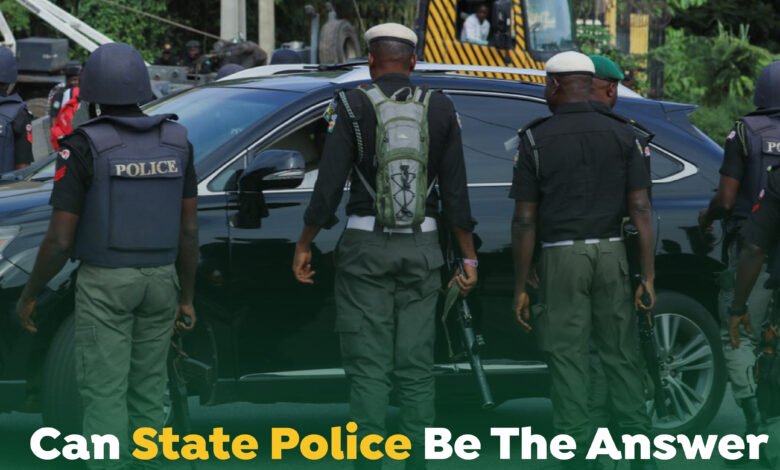
Nigeria’s security landscape is a troubling one. Lives are shattered, and homes are lost to the ever-present threat of kidnappings, banditry, and terrorism.
In 2014, a glimmer of hope emerged – the National Political Reform Conference proposed state and community policing. However, both President Goodluck Jonathan and his successor, Muhammadu Buhari, shelved the initiative despite worsening insecurity.
These former presidents offered “flimsy” excuses. Jonathan claimed Nigeria wasn’t “ripe” for state police, while Buhari insisted on local government autonomy was priority before state policing.
Now, with President Bola Ahmed Tinubu facing a nation desperate for solutions, state police is back on the table
Heeding calls from governors, the President is considering state police to bolster a crumbling security architecture which is overwhelmed by the surging activities of kidnappers, bandits, secessionists, and terrorists.
Divided opinions
Currently, 16 governors have backed the establishment of state police, while the remaining 20 are expected to decide whether they are for or against it in the next few weeks.
Reactions are mixed. Peter Obi, the Labour Party’s 2023 presidential candidate, welcomes it. However, Rabiu Kwankwaso, the former Kano state governor with a history of flip-flopping on the issue, takes a different stance.
In Kwankwaso’s recent chats with journalists in Abuja, the presidential candidate of the New Nigeria Peoples Party NNPP in the last election said the security problem in the country can only be solved by the Nigerian army.
Kwankwaso would go on to mock the state governors for setting up security outfits, saying, “We have seen states forming some security outfits. Sometimes, you laugh. The level at which it is today is at the level of the Nigerian military, and anything short of that wouldn’t work.” The former Governor of Kano added that tackling insecurity should be left to the federal government.
While the former Kano state Governor may be right on the height of insecurity in the country, saying it is only the Nigerian military that has the magic wand to solve the security problems is incorrect.
Crude but effective
Given the efforts of the likes of Amotekun in Southwest, Yan Banga in Sokoto State, Kaduna State Vigilance Service in Kaduna State, Civilian Joint Task Force in Borno State, Green Sheriff in Cross Rivers State among others have made in combating the menace of insecurity; dismissing the existing state security outfits as inadequate will be unfair.
The security outfits have made the news countless times for storming kidnappers’ hideouts and offering military intel about terrorist groups, as well as joining them in combing the forests in search of criminal elements.
Despite being equipped with locally made weapons, these security outfits have recorded incredible security feats that could only be achieved with sophisticated weapons.
So, trivializing their roles in curbing security challenges in the country is the least expected of a former Defence Minister.
Why state police
So, why do governors clamor for state police? The answer lies in local knowledge.
Security threats like kidnapping and banditry thrive on insider information.
Someone from the North cannot pinpoint kidnappers’ hideouts in the South without local intel. State police, with their roots in the communities they serve, can bridge this gap.
Security experts believe state police, properly trained by the military and police, equipped, and well-paid, can alleviate the crisis. Hence, there is a need for the creation of state police to bridge the gap.
Security experts believe state police, properly trained by the military and police, equipped, and well-paid, could significantly improve security.
They also emphasise the importance of allowing them to operate freely, without political interference. Examples abound: Argentina, Australia, Brazil, Canada, Germany, India, Mexico, and Indonesia all utilise state policing to varying degrees, with demonstrable success in mitigating security challenges.
Can Nigeria follow suit? Only time will tell, but one thing is certain: the current situation is unsustainable.
Even though the path forward may not be easy, with careful implementation, state police could be a powerful weapon in Nigeria’s fight against insecurity.





